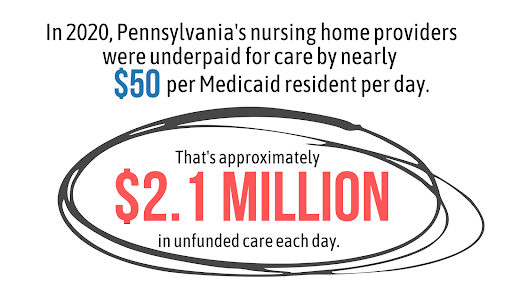A Stimulus Would Mean ‘Survival’ for Long-Term Care
After more than a year, a sense of normalcy is returning to Pennsylvania. Schools and businesses are reopening. Communities are putting Covid-19 behind them. But as we look in the rearview mirror, it’s easy to see the devastation the virus left in its wake, especially for our elderly population. As we look ahead to the future, it’s evident the bridge to future care, for that same population, is on the brink of collapse.
For the past 15 months, long-term care facilities –– nursing homes, personal care homes and assisted living communities –– have remained open, providing care for Pennsylvania’s most vulnerable residents. However, as other sectors take steps to reopen, those same long-term care facilities, where our parents, grandparents and loved ones reside, are now bracing to shutter their doors.
“Not a day goes by that we don’t hear from administrators and operators throughout Pennsylvania, explaining how desperate this situation really is,” says Zach Shamberg, president and CEO of the Pennsylvania Health Care Association. “For the first time, many providers are considering selling, reorganizing or simply closing their doors altogether. The long-term care model of today is simply unsustainable without much-needed federal and state support.”
According to the Pennsylvania Health Care Association (PHCA) –– a statewide advocacy group representing long-term care providers, frontline workers and residents –– many providers are struggling to recover from the financial impact of the pandemic, jeopardizing care for thousands of seniors in a state with one of the oldest populations in the country. Covid-19 has caused operating costs to skyrocket, but the root of the financial distress began with a lack of investment in long-term care for the better part of the last decade.

An Underfunded Medicaid System
Pennsylvania’s Medicaid program falls short of funding care for seniors in nursing homes by nearly $50 a day per resident. With nearly 70 percent of the more than 60,000 nursing home residents relying on Medicaid for their care, nursing home providers worked with operating margins of -2.4% heading into March 2020. A lack of investment in senior care, compounded by exorbitant Covid-19 costs during the pandemic — while the state gathered and stockpiled personal protective equipment — has created alarming uncertainty for providers throughout the state.
The American Health Care Association reported 143 facility closures or mergers occurred nationally in 2020, with an additional 1,670 projected in 2021. Home to more than 113,000 long-term care residents, such facility closures in Pennsylvania would be devastating, especially as nearly one million seniors will age into the demographic most in need of long-term care over the next 15 years.
No Covid-19 Legal Protections
Adding to the burden of financial hardship for long-term care providers is a lack of targeted Covid-19 protections to shield them from opportunistic lawsuits. Throughout the pandemic, providers received more than 330 directives from both state and federal government agencies, communicating how to manage care and protect residents.
On May 14, 2020, former Pennsylvania health secretary Dr. Rachel Levine recognized in an order to nursing home providers that “the spread of COVID-19 is occurring despite the best efforts of public health and other officials and personnel to mitigate and control the spread within these facilities.”
Even with attempted support from government agencies, it quickly became apparent Covid-19 would not obey any directives.
Providers saw a glimmer of hope last fall when the Pennsylvania General Assembly passed a bill to protect healthcare facilities, schools, manufacturers and other businesses from Covid-19 lawsuits. But PA Governor Tom Wolf vetoed the bill, leaving providers vulnerable to lawsuits stemming from an unprecedented event that health agencies couldn’t manage.
Trial attorneys from Pennsylvania and other states are soliciting families to file lawsuits against nursing homes already, as a way to profit from the pandemic. Adding to the perfect financial storm, long-term care providers are seeing insurance premiums skyrocket — if that provider hasn’t already been dropped by their insurance company.

Supporting Pennsylvania’s older population
Pennsylvania has received $7.3 billion in federal stimulus funds through the American Rescue Plan –– money that can support long-term care providers in securing personal protective equipment, Covid-19 testing and staffing needs.
Shamberg said providers are calling on the General Assembly to allocate nearly $450 million of the stimulus to long-term care, enabling them to invest it back into residents and workers.
“The American Rescue Plan is not about success –– it is about survival. Long-term care is in crisis. Without a significant investment in the care of seniors today, there will not be any care to rely on tomorrow.”

Pennsylvania residents agree: long-term care workers and residents should be prioritized to receive American Rescue Plan funds.
In a recent statewide survey of 800 registered Pennsylvania voters, 40% percent of the respondents said long-term care should be financially prioritized over other considerations. More than 60% of the respondents said long-term care providers need more government funding to continue protecting residents and workers.
State leaders are expected to allocate the American Rescue Plan funds by the time the state budget process ends on June 30.
This content is sponsored by the Pennsylvania Health Care Association. PHCA is a statewide advocacy group representing long-term care providers including nursing homes, assisted living communities and personal care homes, frontline workers and residents. To learn more, visit FundTheFrontLinesPA.com.




